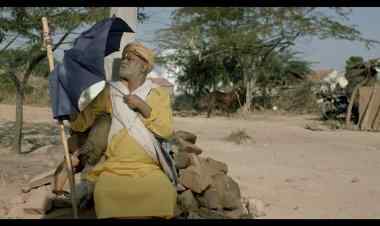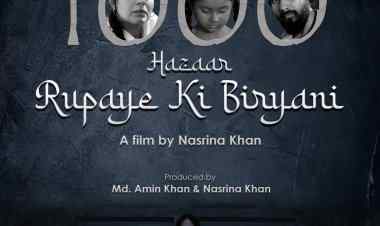Review: SHESH PATA – (THE LAST PAGE) BY ATANU GHOSH
'Shesh Pata the release of which was held up for more than a year for the pandemic, extends the limits of your patience waiting for what is going to happen in the end and also in the middle and the beginning, not necessarily in that order', writes Shoma A.Chatterji
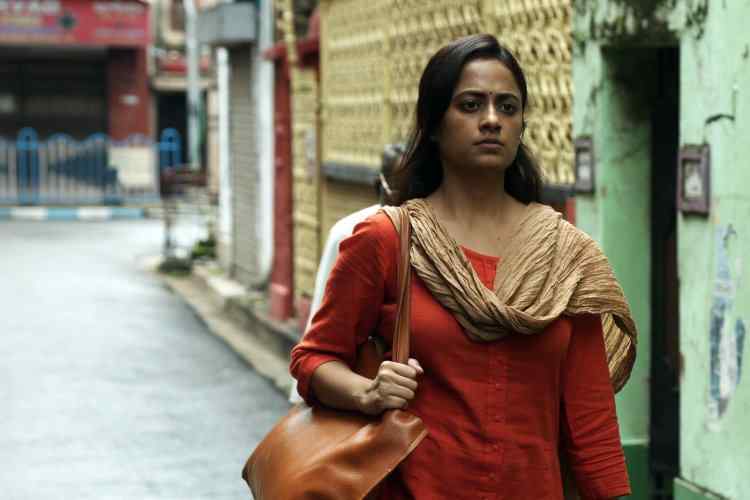
Noted Indian film scholar and author Shoma A. Chatterji
Trust filmmaker Atanu Ghosh to always take you by surprise. In fact, springing surprises on an unsuspecting audience used to be very predictable and often, happy stories. But fragmented lives define his style and his approach to his kind of cinema. His recent film Shesh Pata the release of which was held up for more than a year for the pandemic, extends the limits of your patience waiting for what is going to happen in the end and also in the middle and the beginning, not necessarily in that order.
Shesh Pata unfolds the story of Balmiki Sengupta (Prosenjit Chatterjee), a one-time famous litterateur who has allowed his life to go to the dogs following the brutal murder of his actress wife Roshni whose naked body was found in the Maidan. The murder remained unsolved. A publisher has paid him a handsome advance on the promise that he will write a book revealing the mystery around the murder of his wife way back in 1991. But when the film opens, he has not written a single line. We see him in the middle of a field, tearing off dried grass and some wet mud where, one presumes, his wife’s body was discovered.
Balmiki Chatterjee is a wastrel. He smokes like a chimney when he is not boozing up, is dressed in dirty kurta and pyjamas, lives off food packets and dabbas brought by a little boy, a daily maid who does the brooming and cleaning, a masseuse who visits to give him a massage and perhaps also sleeps with him in a dirty flat filled with faded photographs of his dead wife hanging on jaded walls inside a dilapidated building that has seen better days.
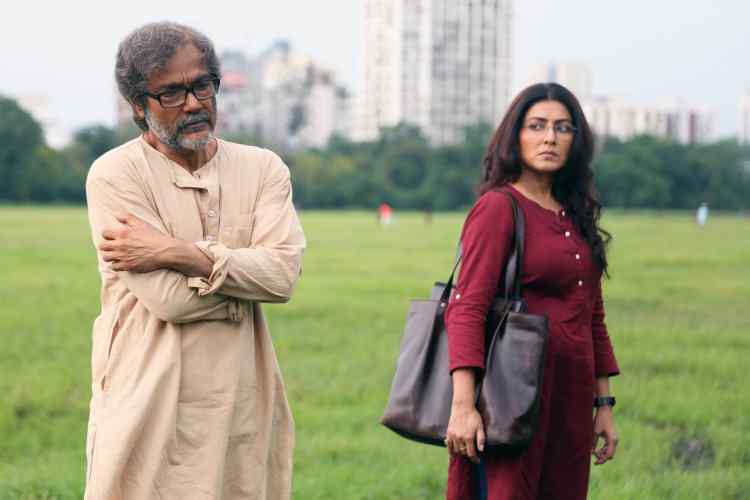
Image: film still
Is Balmiki Chatterjee for real? Yes, he is, with his balding pate, his uncombed hair, his reclusive and angry disposition that spells out “failure” with every breath. Then there is Sounak Hazra (Vikram Chatterjee), a loan recovery agent appointed by the publishers to push Balmiki to finish his book and deliver the msg. “My hand pains, and my head aches so I cannot write” says Balmiki glibly, without either guilt or embarrassment. Sounak, threatened by the loss of his unenviable job, brings in a sophisticated, slightly upper-class woman named Medha (Gargee Roychoudhury), to do the writing while Balmiki narrates the story.
Sounak, a young man, is struggling with his own pains of funding his brother’s management education. His honest and principled father is rendered jobless when films began to fade away completely to make way for digital, as he worked with celluloid prints and negatives. Deepa, (Rayoti Bhattacharya), Sounak’s girlfriend of seven years, works as an artist in a ceramic factory, her late father’s business appropriated by others. But she offers solid backup to Sounak, and there are some delightful scenes of the two sharing a night at a cheap hotel, or laughing over the South Indian song playing on the music system of a South Indian restaurant or just walking along together to share some time. She has a younger brother who chooses to play ludo over trying for a job as he is very ‘political’!
Medha, the lady who has been appointed “writer” to write Balmiki’s book as he dictates, has a back story too. She became friends with Sounak who helped her gain ownership of her flat when she was being harassed by her husband with who she is fighting a divorce case. She is a strong, mature and educated young woman who lives life on her own terms but is lonely and aimless. She likes the company of Sounak who becomes a good friend, though younger than herself.
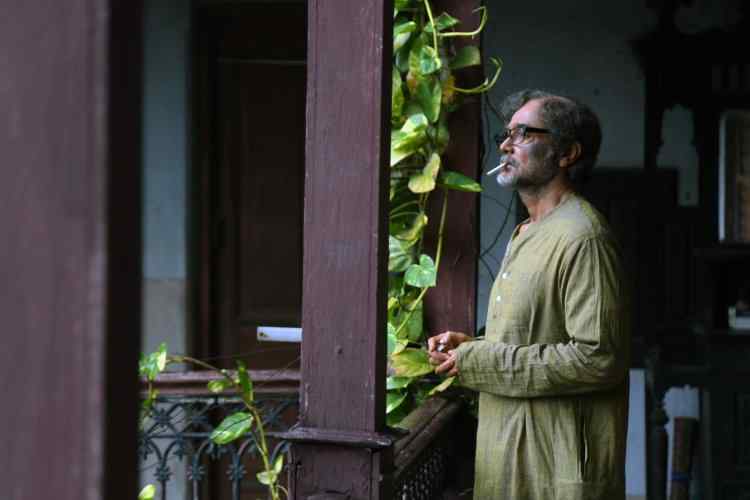
Image: film still
All the three major characters are marginalised by life itself, heavily burdened by issues and problems they have no control over. Balmiki is different. His neighbours not only avoid him like the plague but also wait for him to pop off so that it will be a good riddance of bad rubbish. It is the little errand boy who brings fresh flowers to him and fill a dish with these on the centre table everyday. Balmiki, the oddity that he is, polishes brass rupee coins and stores them in a small box. He gives a coin each time to the little boy who now has a solid collection of coins.
It takes some time for Balmiki to open up to Medha who slowly begins to warm up to this wasted man as she writes down the story he dictates to her. He even takes her to the Maidan where his wife’s body was discovered. This, along with the very rare and mood-centric Tagore song they sing together, suggests the subtle bonding that has grown between these two unequal people united only through their loneliness and their fractured memories. When Medha catches on the song number Balmiki begins, he slowly approaches her and softly touches her head in affection, the only frame that shows his growing affection towards her.
The bonding allows the book to finally get dictated to Medha intercut with memories of Roshni whose pictures on the wall are now faded beyond recognition. But the twist comes when the last page of the book does not get written by a strange turn of destiny. However, the last page finally gets written, by someone else at the last moment and Vikram’s job is saved while Medha is left somewhat content with the job having been done.
The title of the film “The Last Page” or Shesh Pata is more philosophical than literal because the book Balmiki is writing and this last page which he leaves unwritten is not important in the film. It is just an invisible thread that brings a few broken individuals together for some time till they go their own separate ways. It is metaphorical too, because none of us can really predict what will be written on the last page of our personal lives because we will never write it.
One drawback for the mainstream audience which loves Ghosh’s works is the intellectual references used in the exchanged between Balmiki and Medha both of whom are well-read and possessed of excellent intellectual memory. But, to tell the truth, these really do not belong. More in context are references to political realities seen through Deepa’s personal life, the forced joblessness that technology imposed on Sounak’s father, and last, but never the least, the exchanges between Balmiki and Medha which points out one more commonality in their bonding.
The other drawback is based on lack of logic. How can any writer, never mind how famous he once was, having retreated from writing and also from Life in general, several of whose novels were banned either for political reasons or for obscenity, be so much in demand by a publisher even 20 years after his voluntary retreat into nothingness? Why should he be paid to write what so late in the day, amounts to nothing more than yellow writing? Will Roshni be remembered 20 years after her death? One wonders.
Goutam Basu’s art direction, creating the indoor scenes within Deepa’s and Sounak’s homes, the capturing of the narrow streets of Kolkata, the interiors of the ceramic factory, the terrible state of Balmiki’s flat including the dilapidated building he lives in, is so aesthetic and creative that he should most naturally win the National Award. You can feel the rains specially when Balmiki steps in from outdoors, apparently having taken a fall in the slush outside. The entire film gives a cloudy feel though it passes through a year or so.
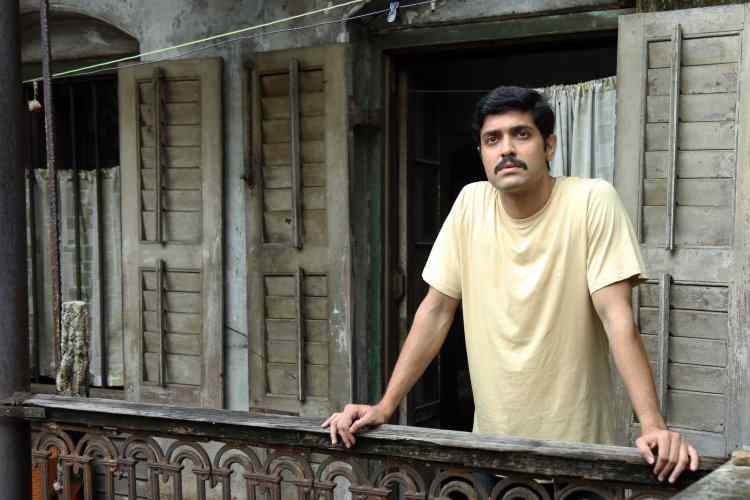
Image: film still
Debajyoti Misra’s musical score, including the two Tagore numbers sung entirely by the actors themselves, adds to the integrity of the music in the film. Anindit Ray and Adhep Singh Manki’s sound design is so smooth and seamless that you do not even notice it, so beautifully it weaves itself into the visual narrative. Sujay Dutta Ray’s editing cuts through the changes from Medha’s posh flat to Balmiki’s dilapidated apartment that might have seen better days but not even a shred remains, through the publisher’s office and Deepa’s sojourns with Sounak without a single jerk.
However, the main string that holds these fragmented lives and this dark story together is just one man Prosenjeet. This is perhaps, the most outstanding performance in his forty-years-long career. In fact, many in the audience could not recognise the star well into 30 minutes of the film. He has been given a complete image change, what with a bald pate, scraggly little hair on his unkempt head, his irrational behaviour, his sudden breaking into a song-dance number that makes no sense except offering us a glimpse into his mental state, is to be seen not only to be remembered but to be experienced and felt.
Gargee RoyChoudhury as Medha gives him just the kind of histrionic company he needs to complement his performance. Vikram Chatterjee too, does justice to his image change by the director and injects life and spirit into Sounak though his world seems to be collapsing around him with his clients giving him the slip one after the other including Balmiki.
Rayoti makes her big screen debut is is very impressive indeed. She wears very simple clothes, has a sense of humour and has complete faith in the relationship and in Sounak. Balmiki’s landlord, waiting for the author to kick the bucket to let out his flat to someone else, is also quite effective.
Shesh Pata to this critic, is a very very dark film and Soumik Haldar’s cinematography keeps it as dark as he possibly can. There is not a single moment of relief or reprieve except a couple of delightful exchanges between Sounak and Deepa, who represent the struggling segment of the Y generation, wanting to remain honest but stumbling to stick on. Ghosh generally portrays fragmented souls in his films but he always shows a ray of light at the end of the dark tunnel. Shesh Pata is deprived of that ray of light. If it is there, we cannot see it. Why?
***
What's Your Reaction?





















































